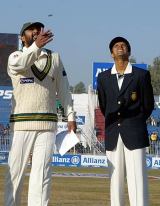Note this month as a milestone in your life. Remember where you were,
what you did, how you felt. Depending on what matters to you and how old
you are, mark it in somewhere near John F Kennedy's shooting, Live Aid
(first time around), September 11 and July 7. If you loved cricket's old-order lament, if you covet the new world rejoice, for this is the month that the world of cricket finally turned on its head after years of leaning like Pisa'a tower.
One-hundred-and-twenty-eight years and ten months since Australia and
England played the first Test match, Pakistan and India drew match
number 1781 and won the world - or more precisely India did. Cricket's
seat of power flew over land and sea, sniggered above Dubai, and found a
new home in New Delhi. With the announcement of a series of
top-billing bilateral tours - and quiet withdrawal from ones that did not
fit with the business strategy - the Indian cricket board showed ICC's
men of finance what finance really is and made the world dance for its
rupees. Australia, England, and Pakistan, all cleverly and lucratively
embraced. New Zealand, Bangladesh, and the ICC Champions Trophy were cast
away as untouchables.
India's strike was swift and sure, received with barely a murmur of
official dissent from the ICC whose Future Tours Programme may not have
collapsed but immediately took on the look of a supporting act. How, you
might have wondered, would cricket's ruling body respond to India's
billion strong consumer market - and ability to generate 75% of cricket's
revenues - when it reacted so feebly to little Zimbabwe's little Hitler? With a polite letter, in fact, which is diplomatic code for surrender. ICC, for its part, had no option. India had snared Australia, England, and Pakistan in its trap, and Bangladesh and Sri
Lanka, at the very least among ICC's other full members, are unlikely to
grumble.
The benefits of this new schedule are many. It makes infinite sense
for India and Pakistan to play each other on a two-yearly cycle akin to
the Ashes, providing both regularity and some longing to these
essential encounters. Indeed, ICC's special accommodation of
Australia's and England's home seasons in its tours programme - everyone else had to fit around - reeked of old colonialism, and with hindsight
looks remarkable considering Asia's burgeoning power in the game when
the programme was agreed to.
Further, more tussles between India and
Australia and England are a sensible recognition of India's clout in
world cricket. It is the fans that generate that phenomenal clout who
deserve to see the encounters they cherish. The Australian, English, and
Pakistani boards will not complain because they will benefit too.
Where this leaves Bangladesh, New Zealand, and Zimbabwe - when it
returns to Test cricket - is harder to judge. But an obvious role for ICC
is to ensure that smaller countries are not sacrificed at the
altar of corporate greed. After years of campaigning against the
illegitimacy of a sport run by a privileged and colonial elite, it would
be intensely hypocritical of India to create a new elite and damn the
beggars at the banquet. Such a move would be against India's long held
view of the future of cricket as a sport ripe for globalisation and its support for cricket's new entrants. It would also demonstrate a certain arrogance in dismissing the lessons of
history, a history that reveals how it took years for countries like
India and Pakistan to demonstrate both their cricketing prowess and
their audience-pulling power.
Ultimately, this is how India's audacious move will be judged. In our
world driven by consumers, markets, and revenues, a world that places
ever higher value on sport, entertainment, and technology - cricket, we
know, encompasses all three - few should begrudge India's right to state
the reality of its leadership position in world cricket by creating a
tour programme that serves its purpose. Australia may have the best team
but India is the biggest fish or the "
big beast of cricket" as Michael
Atherton put it. Leadership, though, carries responsibility and
requires values. India's unilateral declarations of the past
month - and importantly outside the sphere of the ICC - are an
irresponsible beginning. Derogatory remarks about other countries, such
as those about Bangladesh, expose a shortage of values other than
pursuit of profit.
This month, India - and more generally Asia - finally seized control of
international cricket, and there is much that feels right about this new
world cricket order. But the test of leadership really begins
here. Unless cricket's Age of India allows the minnows and the big
beasts to thrive together - and works in partnership with those outside
India and Asia - this month's milestone may become difficult to
celebrate. Cricket's Age of Empire, ruled by Australia and England and
governed by the clubs of Marylebone and Melbourne and the Imperial
Cricket Conference, once seemed immortal too. It is now dead.
